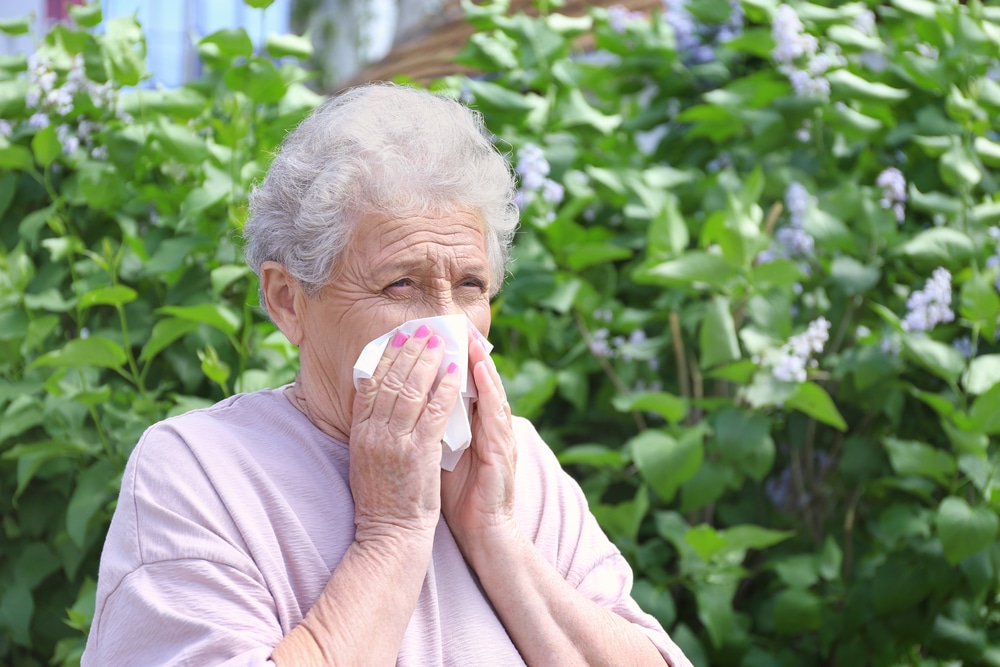People often wait enthusiastically for the first sign of spring. Some delight in sighting the first robin darting about on the ground before spreading its wings and flying back up to into the tree branches. Others watch for the daffodils to poke their cheery heads through the ground or listen for the sounds of frogs singing in the evening. Some simply watch for the home improvement stores to flood the airwaves with gardening ads. However eagerly they embraced the start of the season, spring allergy sufferers are inevitably glad to see the cause of their misery go. When do spring allergies end?
When Do Spring Allergies End?
Allergies may have you dealing with a runny nose, itchy or watery eyes, and a persistent post-nasal drip. Or, they may have you sneezing, coughing, and uncomfortably congested. What’s causing your misery, and when do spring allergies end? According to the Cleveland Clinic, tree pollen tends to arrive in late March and hang around through the middle of May. Then, grass pollen takes over. It normally torments allergy sufferers from mid-May until the middle of July. Unfortunately, some allergens like dust, mold, and pet dander linger throughout the year, and summer triggers like weed pollens and ragweed arrive not long after the spring culprits finally fade away. That means dealing with allergies can be quite the challenge. Using these tips for thriving despite spring allergies may help.
Be Proactive About Treating Your Allergies
If you know that spring allergies are a major problem, don’t wait for them to go crazy to begin treatment. Ideally, you should begin taking your medication about two weeks before you would expect your seasonal allergies to flare. If you aren’t comfortable with pretreating your allergies, then be sure to begin treatment at the first sign of symptoms.
Track Pollen Levels
Keep an eye on the pollen levels in your area. On days when they’re particularly high, try to limit your time outdoors. If you have to be outside, consider wearing a mask to limit your exposure to the pollen. This can be especially helpful if you need to tackle outdoor chores like tending to flower beds or cutting the grass.
Change Your Air Filters
The air filter for your HVAC system should be changed regularly, but it’s especially important during allergy season. A quality filter can help trap some of the allergens that gain entrance into your home, improving your indoor air quality and your comfort. Many vehicles also have cabin air filters, so if you do a lot of driving and have been noticing an increase in discomfort during or after your commute, you may want to check your vehicle’s maintenance records.
Clean House
Dust, pollen, and allergens are relentless invaders, and removing them is vital if you want to remain comfortable in your own home. Cleaning your home regularly is the best way to do that.
Keep Your Windows Closed
Opening the windows to let the gentle spring breeze chase away the stale air is a seasonal rite of passage for many people, but it also lets pollen inside your home. If you’re prone to allergy troubles, it may be best to keep your windows closed to keep the pollen outside. When you find yourself missing the feel of moving air, consider turning on a fan to mimic the breeze.
Don’t Bring Pollen Inside
Hopefully, allergies won’t prevent you from spending some time outside enjoying the gorgeous spring weather. However, you’ll want to be careful to avoid bringing stowaways with you into the safe harbor of your home when you return. Pollen and other allergens can cling to your shoes, clothes, and hair. If you aren’t careful, they can transfer to the surfaces of your home when you get back and emerge later to irritate your respiratory system when your guard is down. To thwart their plans, remove your shoes at the door. Then, take a shower and change clothes.
_____
If spring allergies have you reaching for the tissues, hang in there. The worst of the spring allergens are normally fading away as July heats up. However, if over-the-counter medications and basic precautions really aren’t working for you, talk to your doctor. An adjustment to your allergy medication could improve your comfort and make it easier for you to continue to enjoy a healthy, active lifestyle.
Hoping to retire in Nebraska? Look no further than Kinship Pointe. We offer assisted living and independent living communities in four locations: Kearney Northridge, McCook, Seward, and Wayne. At Kinship Pointe, our delightful staff works every day to help residents pursue their passions and live life to the fullest. To learn for yourself what makes Kinship Pointe so special, schedule a tour or contact us online.

